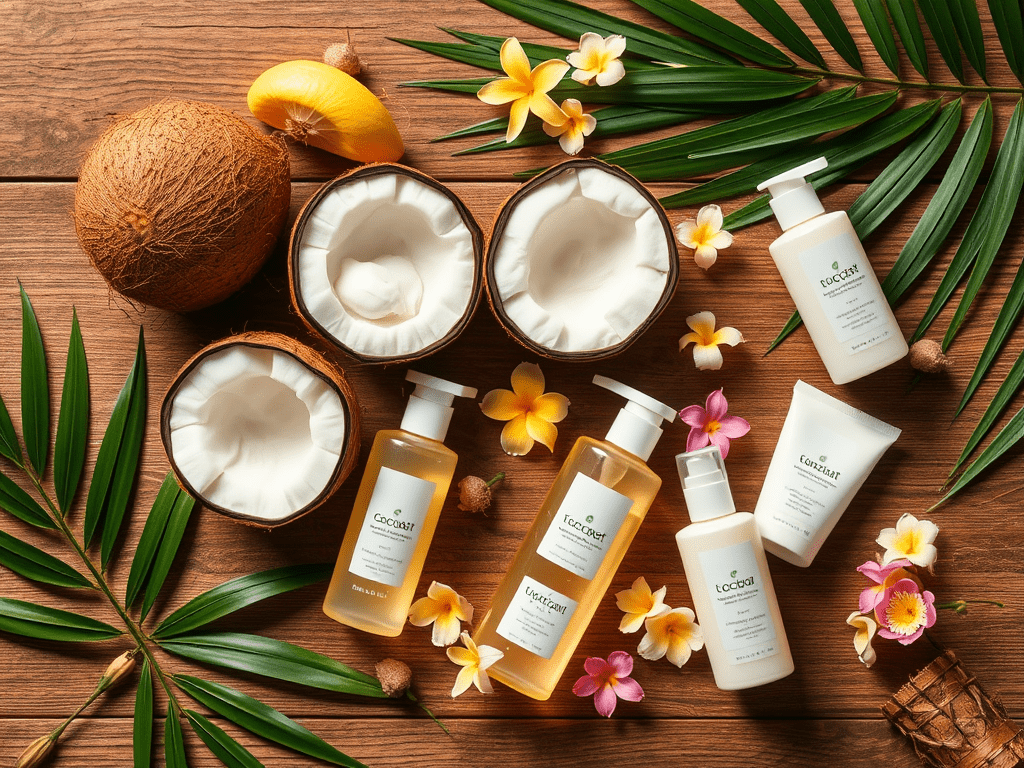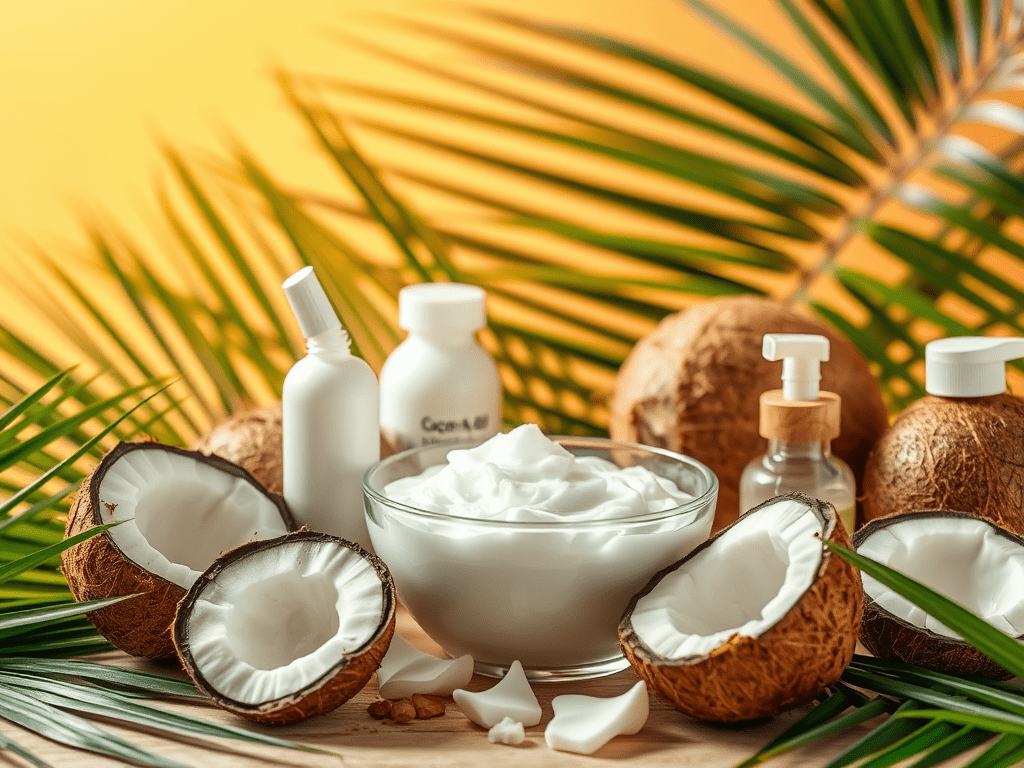
Unlocking the Secrets to Glowing Skin with Coconut Oil: Your Ultimate Guide
Coconut oil is a natural elixir for your skin, renowned for its impressive moisturizing, nourishing, and healing properties. This ultimate guide dives into the countless benefits of coconut oil, how to seamlessly incorporate it into your skincare routine, and what precautions to take for optimal results. By the end, you’ll be equipped with all the knowledge needed to unlock the secrets to radiant, glowing skin through the power of coconut oil.
The Incredible Skin Benefits of Coconut Oil
What are the benefits of coconut oil for the skin?
Coconut oil has long been hailed as a natural wonder for skin health and beauty. This versatile oil is packed with a variety of nutrients and compounds that can provide impressive benefits for the skin.
Coconut oil is rich in fatty acids, vitamins, and antioxidants that nourish and revitalize the skin in numerous ways.
- Coconut oil is composed primarily of medium-chain fatty acids, such as lauric acid, capric acid, and caprylic acid. These fatty acids have antimicrobial, anti-inflammatory, and moisturizing properties that can benefit the skin.
- The oil also contains vitamin E, vitamin K, and antioxidants like polyphenols that can protect the skin from environmental stressors and free radical damage.
- Additionally, coconut oil has a unique molecular structure that allows it to penetrate deep into the skin, delivering its nutrients and beneficial compounds directly to the cells.
How does coconut oil hydrate and moisturize?
One of the most well-known benefits of coconut oil for the skin is its ability to hydrate and moisturize. This oil is a natural emollient, meaning it can help to trap moisture in the skin and prevent water loss.
Coconut oil is an excellent moisturizer for all skin types, from dry and flaky to oily and acne-prone.
- The fatty acids in coconut oil are similar to the natural oils found in the skin, which allows the oil to be readily absorbed and utilized by the skin.
- Coconut oil helps to strengthen the skin's natural barrier function, preventing transepidermal water loss and keeping the skin hydrated and supple.
- The oil's antimicrobial properties also help to maintain the skin's optimal pH balance, further promoting a healthy, hydrated complexion.
Can coconut oil help with acne and blemishes?
In addition to its moisturizing benefits, coconut oil may also be helpful for addressing acne and other skin blemishes.
Coconut oil's antimicrobial and anti-inflammatory properties make it a potentially effective natural treatment for acne.
- The lauric acid in coconut oil has been shown to have potent antibacterial effects against the Propionibacterium acnes bacteria, which is a primary contributor to acne formation.
- The oil's anti-inflammatory properties can also help to soothe redness, swelling, and irritation associated with breakouts.
- Coconut oil may also help to unclog pores and remove excess sebum, which can further prevent acne from forming.
Coconut oil is a true powerhouse for skin health, offering a wealth of nourishing, hydrating, and blemish-fighting benefits. Whether you have dry, oily, or combination skin, this versatile oil is worth incorporating into your skincare routine. With its unique blend of fatty acids, vitamins, and antioxidants, coconut oil can help to reveal a more radiant, youthful, and blemish-free complexion.
Unlock the Power of Coconut Oil: Your Ultimate Skincare Companion
How to Incorporate Coconut Oil into Your Skincare Routine?
Coconut oil has long been revered for its versatility and numerous benefits for the skin. From its moisturizing properties to its antibacterial and anti-inflammatory qualities, this natural wonder can be a game-changer in your skincare routine. In this segment, we'll explore the various ways you can incorporate coconut oil into your regimen for radiant, healthy skin.
Discover the Moisturizing Magic of Coconut Oil
- Coconut oil is an excellent natural emollient, providing deep hydration and nourishment to the skin.
- Apply a small amount of coconut oil directly to damp skin after cleansing, gently massaging it in for a luxurious, dewy finish.
- For an extra boost of hydration, mix coconut oil with your favorite facial serum or moisturizer to create a custom blend tailored to your skin's needs.
- Incorporate coconut oil into your nighttime routine, allowing its soothing and replenishing properties to work their magic while you sleep.
Can Coconut Oil Be Used as a Makeup Remover?
Removing makeup can be a tedious task, but coconut oil can come to the rescue. This versatile ingredient can effectively break down and dissolve even the most stubborn makeup, leaving your skin clean and refreshed. In this segment, we'll explore the benefits of using coconut oil as a makeup remover and how to incorporate it into your cleansing routine.
Harness the Cleansing Power of Coconut Oil
- Coconut oil's unique composition allows it to effortlessly dissolve and lift away makeup, including waterproof formulas.
- Gently massage a small amount of coconut oil onto dry skin, focusing on areas with heavy makeup or stubborn residue.
- Dampen a soft, clean washcloth with warm water and gently wipe away the oil-infused makeup, revealing a clean, radiant complexion.
- Follow up with your regular cleansing routine to ensure a thorough and deep cleanse.
What DIY Masks Can You Create with Coconut Oil for Enhanced Glow?
Achieving a luminous, glowing complexion is a universal beauty goal, and coconut oil can be the key to unlocking this radiant transformation. By incorporating coconut oil into homemade face masks, you can harness its nourishing and rejuvenating properties to reveal a healthier, more vibrant-looking skin. In this segment, we'll explore some easy-to-make DIY masks that can elevate your skin's natural glow.
Nourish and Revitalize with Coconut Oil-Infused Masks
- Create a hydrating and brightening mask by blending coconut oil with raw honey and a few drops of lemon juice. Apply the mixture to clean skin and let it sit for 15-20 minutes before rinsing.
- For a deep-cleansing and exfoliating experience, mix coconut oil with baking soda to form a gentle scrub. Gently massage the mixture onto your face, focusing on areas with clogged pores, and rinse thoroughly.
- Combine coconut oil with mashed avocado and a touch of vitamin E oil for a luxurious, nourishing mask that can help plump and smooth the skin.
Incorporating coconut oil into your daily skincare routine can be a game-changer. From its moisturizing properties to its cleansing and rejuvenating abilities, this versatile ingredient can address a variety of skin concerns and help you achieve a radiant, healthy glow. Experiment with different coconut oil-infused DIY masks and treatments to find the perfect formula that caters to your unique skin type and needs. Unlock the power of coconut oil and unlock the secrets to flawless, glowing skin.
Who Should Avoid Using Coconut Oil?
Who Should Avoid Using Coconut Oil?
Coconut oil has become a popular natural ingredient in many skincare and wellness products. However, it's important to note that not everyone may benefit from using coconut oil, and in some cases, it can even cause adverse reactions. Understanding who should avoid using coconut oil can help individuals make informed decisions about their personal care routine.
Who Should Avoid Using Coconut Oil?
- Individuals with sensitive or acne-prone skin: Coconut oil is a highly comedogenic (pore-clogging) ingredient, meaning it can potentially worsen acne and clog pores, leading to breakouts.
- People with oily skin: Coconut oil is a heavy, occlusive oil that can further contribute to the production of excess sebum, leading to an oily, shiny appearance and the potential for clogged pores.
- Those with nut allergies: Coconut is technically a fruit, not a nut, but some individuals with nut allergies may still react to coconut oil due to cross-reactivity.
- Individuals with dry, dehydrated skin: Despite its moisturizing properties, coconut oil may not be the best choice for those with severely dry or dehydrated skin, as it can sometimes lead to further dryness and flakiness.
What Are the Common Side Effects of Coconut Oil on Skin?
While coconut oil can be beneficial for some skin types, it's important to be aware of the potential side effects that may occur with its use. Understanding these potential issues can help individuals make informed decisions about incorporating coconut oil into their skincare routine.
Common Side Effects of Coconut Oil on Skin
- Clogged pores and acne: As mentioned earlier, coconut oil's comedogenic nature can lead to the development of blackheads, whiteheads, and other types of acne.
- Irritation and allergic reactions: Some individuals may experience skin irritation, redness, or even an allergic reaction when using coconut oil, particularly those with sensitive skin or nut allergies.
- Greasiness and shine: The heavy, occlusive nature of coconut oil can leave the skin feeling greasy, shiny, and potentially uncomfortable, especially for those with oily skin.
- Dryness and flakiness: Contrary to its moisturizing reputation, coconut oil may actually exacerbate dryness and lead to flaky, peeling skin in some individuals, particularly those with already dry or dehydrated skin.
How to Do a Patch Test for Coconut Oil?
Before incorporating coconut oil into your skincare routine, it's crucial to perform a patch test to ensure your skin can tolerate the ingredient. Following a simple patch test procedure can help you avoid potential adverse reactions and determine if coconut oil is the right choice for your skin.
How to Perform a Patch Test for Coconut Oil
- Choose a small, inconspicuous area of your skin, such as the inside of your forearm or behind your ear.
- Apply a small amount of coconut oil to the selected area and gently massage it in.
- Monitor the area for 24-48 hours, looking for any signs of irritation, redness, swelling, or other adverse reactions.
- If you experience any discomfort or negative reactions, discontinue use immediately and avoid using coconut oil on your skin.
- If the patch test is successful and your skin shows no signs of irritation, you can proceed with using coconut oil in your skincare routine, but still, monitor your skin for any changes.
Incorporating coconut oil into your skincare routine can be a beneficial choice for some individuals, but it's important to be aware of who should avoid using it and the potential side effects it may cause. By understanding these factors and performing a simple patch test, you can make an informed decision about whether coconut oil is the right choice for your unique skin type and needs.
Q&A
What are the primary benefits of using coconut oil on skin?
Coconut oil provides numerous skin benefits, including deep hydration, nourishment, and antioxidant protection. Its fatty acids work to moisturize while its antimicrobial properties aid in preventing acne and nourishing damaged skin.
How can coconut oil help with acne and blemishes?
Coconut oil contains lauric acid, which has antibacterial effects against acne-causing bacteria. Its anti-inflammatory properties can soothe skin irritations, helping to reduce redness and swelling associated with breakouts.
Can coconut oil be used as an effective makeup remover?
Yes, coconut oil is an excellent natural makeup remover. Its ability to dissolve makeup, including waterproof products, makes it a gentle and effective choice for cleansing without stripping the skin.
Are there any side effects of using coconut oil on skin?
Possible side effects of coconut oil include clogged pores or acne breakouts for those with oily or acne-prone skin. Some individuals may also experience irritation or allergic reactions; therefore, a patch test is recommended.
What DIY masks can I create with coconut oil for my skin?
You can create various DIY masks, such as a hydrating mask with coconut oil and honey, an exfoliating scrub with baking soda, or a nourishing mask with avocado and vitamin E oil to promote a radiant complexion.
Coconut oil serves as a remarkable companion in the quest for healthy, glowing skin. Its extensive hydration, nourishment, and potential to combat skin blemishes make it a valuable addition to any skincare regime. However, be mindful of your skin type and consider performing a patch test before fully committing. Embrace the versatility of coconut oil and unlock the secrets to rejuvenated, radiant skin today!



